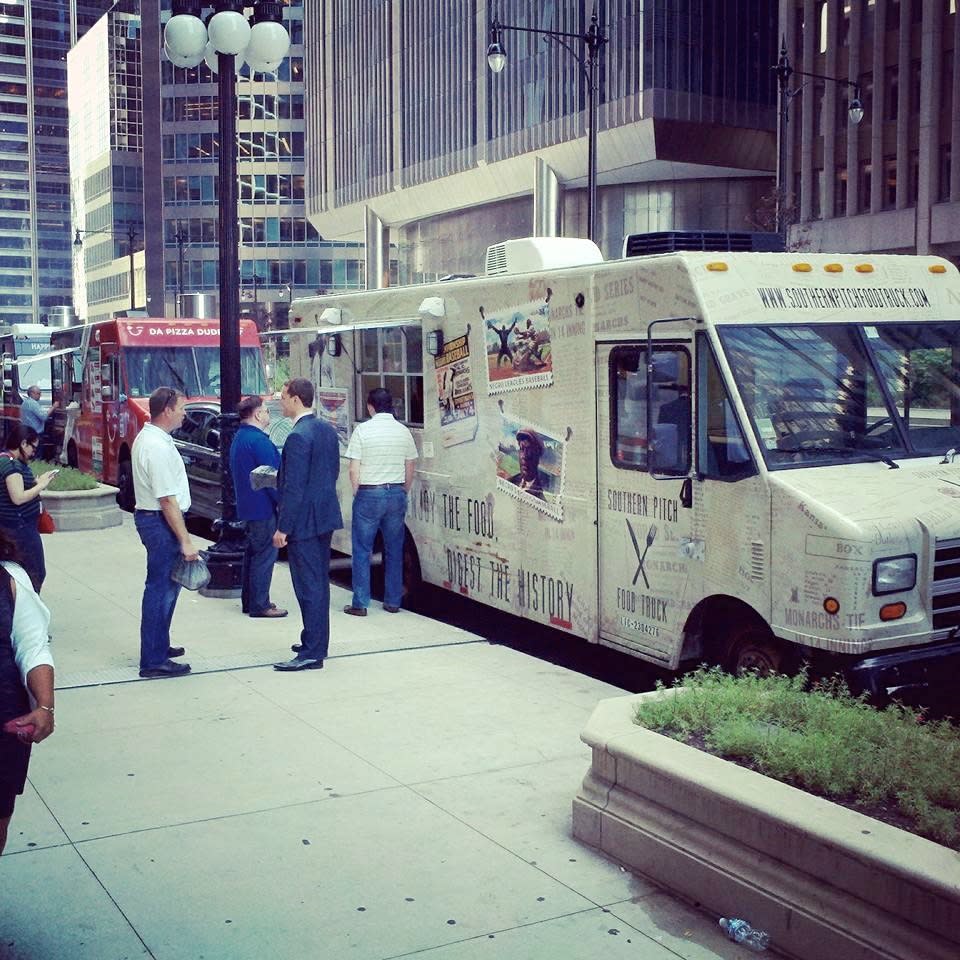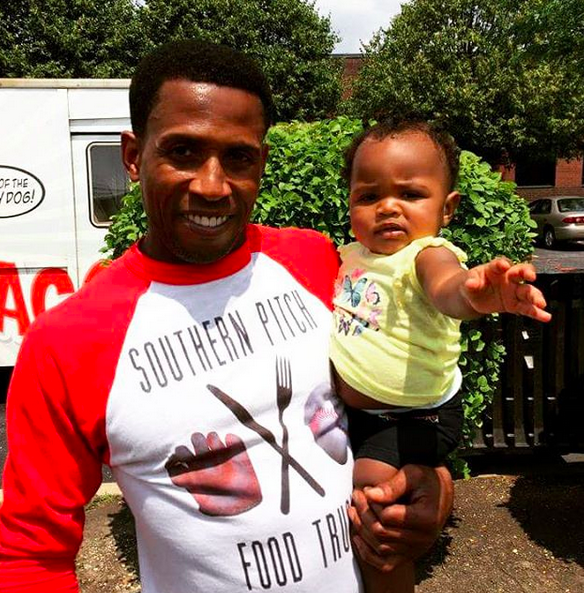How a Food Truck Is Bringing Back the Spirit of Negro Baseball Leagues’ Star Players

The Southern Pitch Food Truck parked for lunch. (Photo: Don Curry)
Peanuts and Cracker Jacks may be the two snacks most commonly associated with baseball. But a new food truck roaming the streets of downtown Chicago is pairing baked wings and BBQ turkey legs with a very specific era in the sport’s history: pre-integration.
The Southern Pitch Food Truck is a mobile restaurant dedicated to serving soul food steeped in the legacy of the Negro Leagues, the period between the late 1800s and 1960s when professional black players excluded from Major League Baseball by segregation formed their own teams and barnstormed across the country.
“I wanted to keep the torch lit for the history of these athletes,” said the truck’s founder Donald Curry, who ran a café with the same mission for five years until losing its lease. “These guys were honorable men who pulled themselves up by their bootstraps and said, ‘If you’re not going to allow us to play your game, we’re going to master it and beat you at it.’”
Related: From Slave to Celebrated Chef: The Surprising Story of Nat Fuller
According to records at the Negro Leagues Baseball Museum, in Kansas City, Mo., roughly 150 players from the primary Negro Leagues are still living. This figure does not reflect others who played on what might be described as minor or semipro teams. But as members of the community continue to age, the number grows smaller and smaller.
“There aren’t going to be any players left, at some point, so I envision [the food truck] as a living memorial to them, in addition to the museum in Kansas City and the Josh Gibson Foundation,” Curry told Yahoo Food. “Alvin Spearman, who pitched for the Chicago American Giants, passed away in January. He was like an uncle to me, he was my go-to guy. That’s one of the sad things about this job. These guys become like family to you, and then they’re gone.”
Related: 8 Craft Spirit Makers Who Are Bringing Back History
With them, memories of the African American sports experience will fade: following beloved heroes, sitting in the stands, nibbling concession fare in the sun.
“Frankly, we don’t know for sure what fans ate at the games,” said Dr. Raymond Doswell, vice president and curator at the Negro Leagues Baseball Museum. “Folks may have brought their own food, but this has not been commented on or researched anywhere.”
Related: Cookbook of the Week: Soul Food Love
But at the Major League fields rented out by Negro Leagues teams, there were general ballpark concessions, where soda, beer, hotdogs, peanuts, and popcorn were typically sold.

Donald Curry with a young fan. (Photo: Instagram/Southern Pitch Food Truck)
In tribute to some of the greatest players of the Negro Leagues, Curry has named Southern Pitch menu items after various icons. But instead of burgers and franks, he chose to serve dishes he has a personal connection to.
Options include the Willie Mays’ Soul Food Wrap, stuffed with collard greens, sweet potatoes, and seasoned meat; the ‘MIGHTY’ Josh Gibson BBQ turkey leg; Hank Aaron’s baked wings — all recipes Curry learned in his grandmother’s home kitchen.
“I grew up watching my grandmother cook,” he said. “The dishes are things that she used to make for us, and so far people seem to really like them.”
A resident of Urbana, Ill., Ernest Westfield, 76, has yet to eat at Curry’s truck, an hour and a half away in the Windy City. But its menu recalls some of the better meals he had as a pitcher for the Birmingham Black Barons from 1959 to 1965, he said.
“It was not easy,” Westfield told Yahoo Food. “We couldn’t stop at a lot of places to eat on the road. Instead, we had to go to the back of restaurants or get our food out of the window. And we ate a lot of bologna sandwiches on that bus, I’ll tell you that. Back in Birmingham, Ala., we’d play at Rickwood Field, and they had a lot of restaurants there that catered to the Negro Leagues,”
He added, “We had a lady who cooked for the players at her boarding house who would make collard greens, meatloaf, stuffing, and all sorts of nice things … but it was very hard once you left town. It was very, very hard.”

